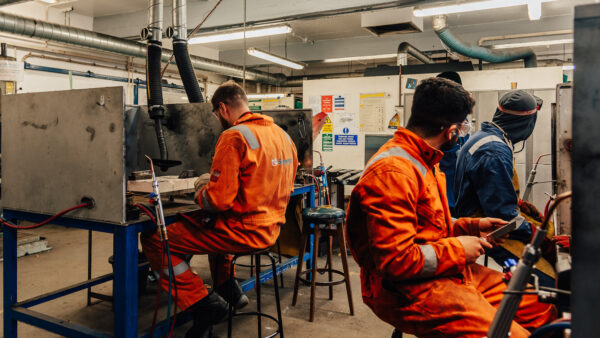u003cp style=u0022font-weight: 400;u0022u003eRetaining older and more experienced employees has long been a challenge for the construction sector and, post-pandemic, increased early retirement is exacerbating the issueu003c/pu003e
Encouraging older colleagues to continue working is important, not just for business capability in the immediate future but also for younger joiners who can learn from more experienced colleagues’ skill sets and wisdom to develop their own.
Older colleagues are not always going to tell you that they’re planning to retire until they formally announce it. In the first instance, it’s important to establish a culture that is conducive to tentative, non-judgemental conversations about the future, that can be comfortably initiated by line managers or colleagues themselves.
Create a culture of transparency
By embedding a culture of transparency and open communication into the workplace, the retirement elephant in the room is removed by default.
Retirement shouldn’t be seen as a negative. An early indication of reflecting on retirement allows the line manager to openly discuss options that can be beneficial to the individual and the business, and also so line managers can see a clearer picture of what aspects of the job are making the individual consider retirement and offer solutions.
Equally, if a colleague has made a decision to retire, there is a suite of support tools that can be used, ranging from financial wellbeing to a staggered reduction in hours, to building a new routine and hobbies away from work.
Older colleagues should be made aware of how roles can be changed to suit their needs and what potential alternative opportunities are available, and be encouraged to consider what else they might want to do.
Some colleagues who are typically ‘on-the-tools’ with a specific physical skill set may find it difficult, or simply not want to, move into other jobs, particularly desk work, which is understandable for the more practicably minded.
Rather than lose this person to retirement altogether, their role could evolve to incorporate training apprentices, health and safety or site auditing. There’s still a manual element and they get to keep the line of work they enjoy while navigating some of the areas they may find challenging.
Embracing flexible work arrangements
Colleagues looking to retire are not always doing it for physical reasons, sometimes it’s about regaining a more flexible work-life balance. Full-time colleagues working in the construction sector typically work around 45 hours per week. This is more than the UK average, so it’s important to think about how flexible working may help them in their later career.
Speedy Hire is currently working to reduce weekly hours from 45 to 42. In addition, the company has pioneered the trial of a flexible working arrangement for more than 700 employees – a first for the construction sector.
The trial included a nine-day fortnight, a 4.5-day week, and/or early and later start/finish times. Detailed analysis of rosters, feedback from customers, productivity, efficiency and more, has provided a holistic view of the commercial viability of flexible working to help our colleagues fit work around their lives.
With societal shifts, such as increasing longevity of life, requiring more pre-retirees to be available to look after ageing parents, or a need for grandparents to look after grandchildren as the costs of childcare become prohibitive for many young families, flexible working arrangements can address potential issues around meeting their personal commitments.
Part-time or reduced hours
Sometimes older colleagues would be happier simply working less. Speedy Hire has colleagues working a couple of days a week and it works well.
It is always more beneficial for an experienced person to stay and share quality time with other colleagues. It can be more difficult to entice colleagues who have left back into the workforce so it’s important to first develop the open culture to have these discussions early and help the colleague to feel valued from the outset.
Furthermore, potential pre-retirees may want to dial down for physical reasons or simply would be happier working less, but they still want to continue earning income because they’d like to provide financial support for their children or anticipate a gap between their retirement income and the current cost of living.
Mentorship and skill transfer
Speedy Hire’s Mentorship and Skill Transfer Programme is a standout example of finding new ways to retain late career colleagues. This initiative pairs colleagues with apprentices or trainees who are entering the workforce.
The primary goal is to facilitate the transfer of knowledge and expertise from experienced colleagues to the next generation.
To incentivise participation, late career colleagues receive bonus payments when their mentees perform well in college and at work. This programme is currently in its first year of the trial phase, with 22 participants showing early promise.
In return we’re looking at a similar schemes for bridging the generational gap and recognising the need for digital skills in the workplace, by tapping into the digital expertise of younger colleagues. Speedy Hire is actively exploring ways to facilitate collaboration between these two groups.
With early retirement numbers increasing, retaining colleagues over 50 has become not only important but essential. Creating a culture of transparency is key to this and allowing open discussions about retirement plans and potential options allows employers to address any concerns and reconfigure roles to benefit the colleague and employer.
Embracing flexible work arrangements, part-time options and mentorship programmes like Speedy Hire’s skill transfer initiative can help bridge the generational gap and inspire a knowledgeable workforce for the future – and ensure all current employees remain motivated and happy at work.
Ellie Armour is chief people officer at Speedy Hire.








